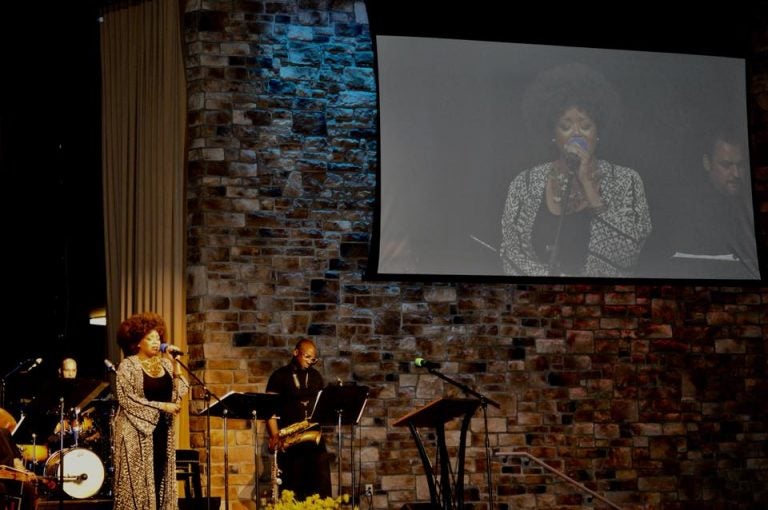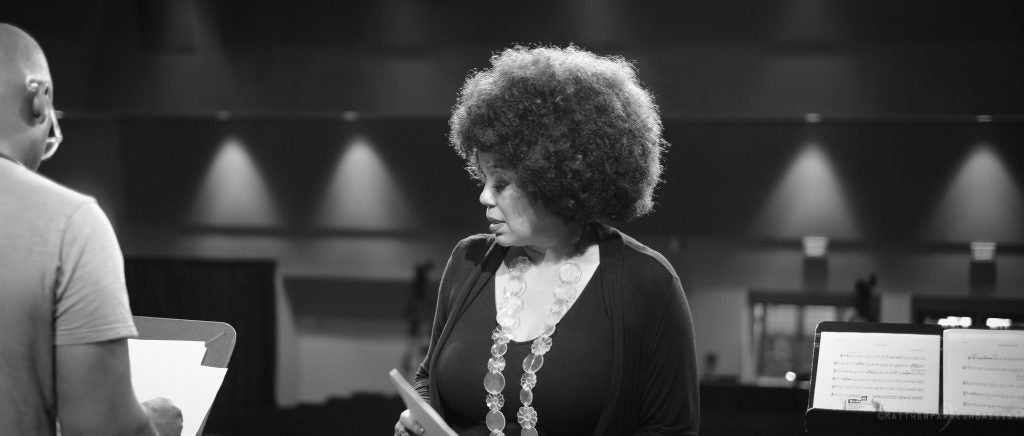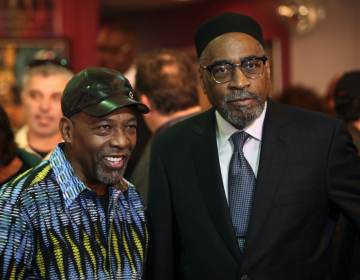Ruth Naomi Floyd, ‘Frederick Douglass Jazz Works,’ and our need for free critical artists
Floyd could have been this generation’s Ella or Mahalia. But she has taken the A Train on a track less traveled — and Douglass is her latest companion on that journey.

A free black woman. Free like Philly. Free like improvised jazz.
Free like Frederick Douglass.
She sings fire. Yesterday, now and the fire next time.
Fire that warms, illumines and carefully burns.
A free black woman singing of a free black man now 200 years old.
This is Ruth Naomi Floyd.
And this is Frederick Douglass:
“Freedom now appeared, to disappear no more forever. It was heard in every sound and seen in every thing. It was very present to torment me with a sense of my wretched condition. I saw nothing without seeing it, I heard nothing without hearing it, and felt nothing without feeling it. It looked from every star, it smiled in every calm, breathed in in every wind, and moved in every storm.”
But with this latest work of hers, “The Frederick Douglass Jazz Works” — centering around its namesake, his legacy and his message — the vocalist, composer, and critical artist is calling forth something more from all who dare bring their ears and hearts.
She takes the stage with a deep dignity, yet fearless freedom.
I would not think it proper to comment on the appearance of an artist, yet, in this case, it is a part of the story.

She wears her hair as an Afro – a beautifully defiant black crown. Someone seated near me whispers, “Yaaaaas Queen!” when she walks out. She’s adorned in all black (as is the entire band) except for a black and white robe with a print on it that forms subtle crosses, if you look closely.
To some, these are simple hair and outfit choices. To others, these are small acts of resistance. In a society that tells black women that they are not beautiful and not the standard of beauty. In a space that has very few black women in it — such as the white church that amazingly and courageously hosted this event. In Trump’s America, these are small but brave acts of resistance and grace.
This is Ruth Naomi Floyd
And this is Frederick Douglass.
Bravely defiant, yet all the while doing so with love.
Reaching out to the sky and the stars
The suite opens with spirituals.
“Hush … hush … somebody’s callin’ my name.”
It is fitting to begin with songs that evoke the calling out of enslaved Africans. Douglass himself found freedom from that evil and “peculiar institution.”
Floyd, saxophonist Keith Loftis, drummer Mark Prince, Matthew Parrish on the bass, Aaron Graves on the piano, Joshua Stamper on guitar, Valerie Gay on the xylophone, Diane Monroe on the violin, and the sisters on background vocals seem to step outside of time as they bring forth the old spirituals with contemporary jazz accents.
They do this brilliantly and, I would say, prophetically for the duration of the suite as jazz dances with not only spirituals, but also gospel, the blues, and Americana.
All the while, Douglass’ words call to the present through the gifted oration of V. Shayne Frederick whose believable vocal portrayal is exactly as I have imagined young Frederick would have sounded.
It is a cathartic and hope-giving journey that Floyd takes us on. I raised my hands in praise for some songs. I raised a fist when hearing the painful truth of Douglass’ remarks on the Fourth of July with the ironic musical arrangements that accompany those still timely words.
Yet I found myself most moved during the surprisingly tender “Midnight Sky and Silent Stars,” a piece based on the little known correspondence between Harriet Tubman and Douglass.
Our Black Moses wrote to Douglass asking for a letter of endorsement for a project that had been written about her. And while Douglass was known for his gifted oratorical skills, his political savvy, his literary and economic brilliance, and liberative advocacy work, he was not known for public warmth. Though he writes:
“Dear Harriet: … You ask for what you do not need when you call upon me for a word of commendation. I need such words from you far more than you can need them from me … The difference between us is very marked. Most that I have done and suffered in the service of our cause has been in public, and I have received much encouragement at every step of the way. You, on the other hand, have labored in a private way. I have wrought in the day – you in the night. I have had the applause of the crowd and the satisfaction that comes of being approved by the multitude, while the most that you have done has been witnessed by a few trembling, scarred, and foot-sore bondmen and women, whom you have led out of the house of bondage, and whose heartfelt, “God bless you,” has been your only reward. The midnight sky and the silent stars have been the witnesses of your devotion to freedom and of your heroism…”
The letter is read in its entirety on stage, and then Floyd’s mezzo-soprano unleashes the full power of her voice and spirit in song.
“Freedom! The midnight sky and the silent stars are your witness! The midnight sky and the silent stars are your witness! The midnight sky and the silent stars are your witness!”
There are very few dry eyes in the audience.
Her voice captures the love and admiration that Douglass rightly had for his sister Tubman.
Her voice captures the pain of a sexism and a classism that brought Douglass accolades during his life, while Tubman would only see a portion of that recognition.
Her voice captures that cry of the prophets whose most faithful witnesses during their lives are the sky and the stars and the God that created them.
Her voice is singing from a place of knowing.
Floyd could have been this generation’s Ella Fitzgerald. She could have been this generation’s Mahalia Jackson. But she has taken the A Train on a track less traveled. A track that we need more artists to board. The path of the prophetic critical artist who creates not for the awards or the money or the applause of the crowd, but rather for their God and for change. Artists for whom the midnight sky and the silent stars are witnesses.
Of prophets and prophecy
I sat down with Floyd recently to talk about “Frederick Douglass Jazz Works.”
We sit at an independent shop near her home in South Philly. Not far from the site where the old Standard Theater once stood on South Street welcoming the Duke, Louis Armstrong, Bessie Smith and other saints. Not far from the part of Philadelphia that DuBois studied when writing “ThePhiladelphia Negro.” Not far from the Starbucks where the police were called on two Philadelphia Negroes.
Her hands hold a white cup holding black coffee. Dressed in all black everything, something like Jay-Z’s lyrics. Something like Cornel West’s uniform. Something like one grieving. Or perhaps the Panthers, or a nun or – yes – an artist. A jazz musician.
She performs. But not to entertain. To speak.
“What is a prophet?” I say.
She speaks jazz. A pause. And then: “A prophet knows the history. Feels the pulse of the present day. Discerns and dissects the future. They have a strong sense of urgency. She acts now. It’s a matter of life and death.”
“Was Douglass a prophet?” I say.
“Oh yes. He stayed close to the root. Didn’t let fruit deter him.”
Ruth Naomi Floyd is a classically trained musician (piano, flute, bassoon, and voice). And this classical stream intersected with a different type of training that she caught from her father.
The Rev. Melvin Floyd, a Korean War veteran, was one of the first black cops in the infamous Frank Rizzo’s Philadelphia. He would ultimately leave that post after serving faithfully for more than a decade to enter into full-time ministry — a ministry that would be later known as Neighborhood Crusades.
He took the word and witness of Christ to the streets of Philly driving around in a van with a coffin on top of it, moving with the performative divinely inspired shock of an Old Testament prophet.
He preached on street corners (bringing nearly 20,000 people to the faith), spoke in more than 600 schools, and pastored a congregation for nearly 40 years before his retirement. He saw the Gospel as not only speaking to eternal salvation, but to daily salvation from substance abuse, poverty, violence, and suffering.
Ruth wasn’t just a PK – a pastor’s kid. She was a PK – a prophet’s kid. And this prophetic word laced itself into the music that’s been a part of her life since she was in elementary school.
This integration of faith and jazz emerged in a powerful way for her when traveling to France with minister, professor and jazz pianist Bill Edgar.
“During the first set, we did jazz standards. Then, in the second, we did gospel tunes. And the audience loved it,” she recalled.
But, amid the international acclaim and awards, she remembers a critic’s statement that she would have to make up her mind: jazz or gospel.
A few years later, she would be sitting in a New York record company’s office — the fruit of her voice and the fruit of her early successes. She was asked to choose again. A path was laid out before her if she would just sing “secular jazz.” A path was laid out before her if she would just sing gospel.
She walked.
“It might be beautiful, and it might have Tiffany’s diamonds on it, but it’s still a handcuff if you can’t be who you are.”
The midnight skies and the silent stars are your witness.
The gospel truth
“I have chosen freedom. Freedom. I speak the truth in love. I continue to show up. Continuing to show up is resistance. Creating is resistance.”
This is staying close to the root. Close to the God who called her to walk this narrow way as an artist.
“Don’t compromise,” she says.
And I flash back to see her standing in the white church in all of her blackness. Not a bit of hate in her body. Not a bit of fear in her heart. And not a bit of compromise beneath that Afro of hers.
No, these aren’t safe gospel songs that the audience will know. Nor are these jazz standards with predictable band soloist rotations for feet to tap to. Floyd asks more of her audience.
She is made in the image of her God who is a creator. Floyd invites the audience into her creation. And dares us to be in the creating business ourselves, particularly the work of creating the new world that Douglass set his hands to.
“What’s your hope with ‘Frederick Douglass Jazz Works’?” I say.
“My hope? That this will help draw listeners to the ultimate root issues. That they’ll be drawn to think again about slavery, freedom, and justice. My goal is truth-telling.”
She pauses.
“And to those struggling … I hope to encourage, convict, and inspire them.”
This is Ruth Naomi Floyd.
And this is Frederick Douglass.
The Rev. Charles “Chaz” Howard, chaplain at the University of Pennsylvania, is an editor and writer. His work has appeared in Black Arts Quarterly, Black Theology: An International Journal, Daily Good, Urban Cusp, Sojourners Magazine, Christianity Today’s Leadership Journal, Chronicle of Higher Education, The Huffington Post, and Slate.
WHYY is your source for fact-based, in-depth journalism and information. As a nonprofit organization, we rely on financial support from readers like you. Please give today.



